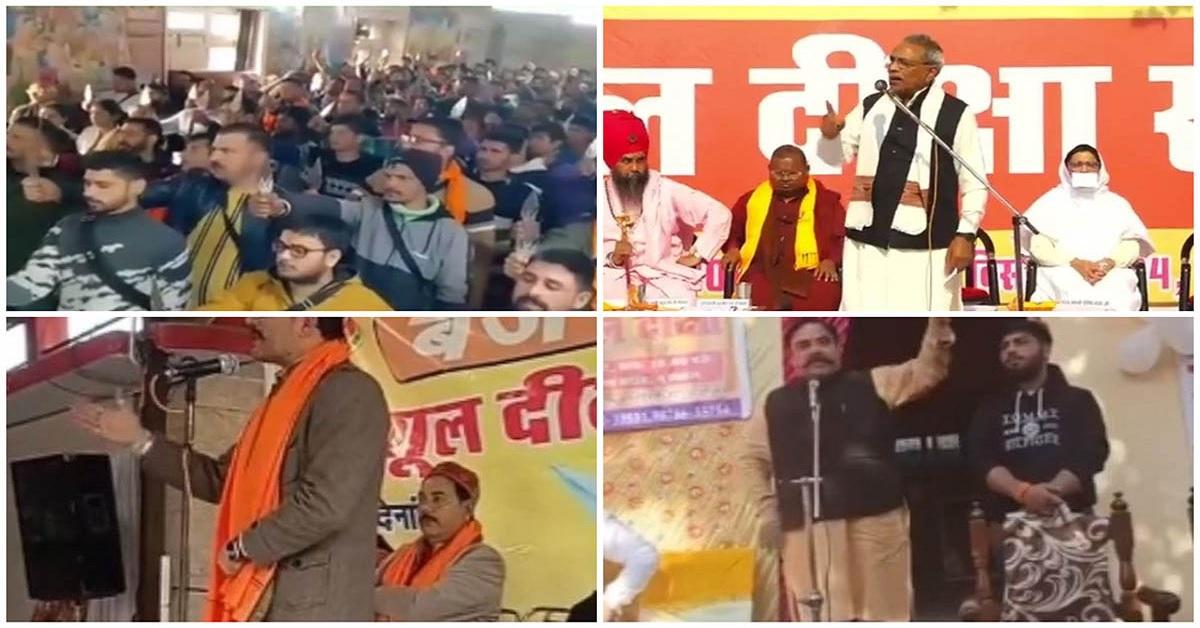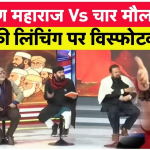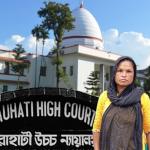
The rise of hate through Trishul Deeksha events: A dangerous trend in India A series of far-right gatherings in December 2024, expose rising hate and the need for immediate action
27, Dec 2024 | CJP Team
In December 2024, a disturbing pattern of communal mobilisation unfolded across several states in India, marked by a series of Trishul Deeksha events organised by far-right groups like the Vishwa Hindu Parishad (VHP), Bajrang Dal, and the Antarrashtriya Hindu Parishad (AHP). Held in Punjab, Delhi, Himachal Pradesh, and Rajasthan, these gatherings showcased inflammatory rhetoric, hate speech, and divisive propaganda targeting minority communities, particularly Muslims and Christians.
These events, which involve distributing tridents and administering oaths to “protect Hindu identity,” have become platforms for promoting exclusionary ideologies and inciting communal hatred. Leaders at these gatherings propagated baseless conspiracies like ‘love jihad’ and ‘land jihad,’ while openly vilifying minorities, calling for economic boycotts, and glorifying vigilantism. Such incendiary remarks not only deepen social divisions but also normalize the idea of violence under the guise of cultural or religious defence.
CJP is dedicated to finding and bringing to light instances of Hate Speech, so that the bigots propagating these venomous ideas can be unmasked and brought to justice. To learn more about our campaign against hate speech, please become a member. To support our initiatives, please donate now!
The complicity of law enforcement, as seen in Sirohi, Rajasthan, where a police officer publicly joined the procession, further highlights the institutional challenges in addressing the rise of hate speech. The spread of these events, coupled with the lack of accountability for their organisers, underscores a broader campaign to marginalise minorities, undermine social harmony, and escalate communal tensions. This piece examines these recent incidents, the dangerous narratives they perpetuate, and the urgent need for robust legal and administrative intervention to counter this alarming trend.
Details of the incidents
- Date: December 15, 2024
Location: Nurmaha, Jalandhar, Punjab
A Trishul Deeksha event organised by the Vishwa Hindu Parishad (VHP) and Bajrang Dal took place in Nurmaha, Jalandhar. During the event, a far-right leader made several inflammatory remarks, invoking controversial issues tied to communal tensions.
The speaker declared, “Now that Ram Mandir is built, Kashi and Mathura remain!”—a direct reference to the ongoing demands by right-wing groups to reclaim the Gyanvapi mosque in Varanasi and the Shahi Idgah mosque in Mathura. Such rhetoric stokes communal sentiments by framing these mosques as illegitimate structures atop Hindu temples.
The unidentified leader also commented on incidents in Sambhal, a district that saw communal tensions and use of excessive force by police forces that resulted in the death of five Muslims, stating, “What’s happening in Sambhal is natural because these people have built structures over many of our temples.” This remark further perpetuated communal antagonism, implying a justification for tensions in the region.
The distribution of tridents, coupled with speeches of this nature, raises concerns about the potential for communal violence. Events like these often serve as a breeding ground for hatred, normalising exclusionary ideologies under the guise of cultural or religious ceremonies. The local administration’s response—or lack thereof—will be crucial in determining whether such provocative activities escalate tensions in the region.
The video may be viewed here:
- Date: December 15, 2024
Location: Delhi
A Trishul Deeksha event organised by the VHP and Bajrang Dal in Delhi witnessed incendiary remarks by Kapil Khanna, the president of VHP Delhi. Khanna declared that the next agenda of the VHP would be the “liberation” of Kashi and Mathura, referencing ongoing demands to reclaim the Gyanvapi and Shahi Idgah mosques. He claimed that the successful construction of the Ram Mandir had garnered public support for these contentious objectives.
Khanna targeted Ajmer Sharif Dargah, a revered Sufi shrine, warning its devotees, “Go and put chaddar there, but next year you’ll have to do kanwar yatra instead.” This remark not only denigrated Muslim religious practices but also sought to provoke hostility against a significant symbol of interfaith harmony. He further propagated conspiracies about ‘love jihad’ and ‘land jihad,’ accusing Muslims of building mazars (shrines) as a challenge to Hinduism and vowed to oppose such structures in Delhi.
The video may be viewed here:
At the same event, Surender Jain, International Joint General Secretary of the VHP, also delivered a speech rife with hate and xenophobia. Jain called for the expulsion of alleged Bangladeshi and Rohingya “infiltrators” from India, accusing them of destabilising the country. He further claimed that Muslim vendors defile food with spit and urine, a baseless allegation aimed at inciting an economic boycott.
Jain escalated communal fear by alleging that Muslims were attacking Hindu festivals and spreading conspiracies about ‘love jihad’ and ‘land jihad.’ He demanded that shop owners display their religious identity, an act that could lead to further discrimination and segregation. He also encouraged Bajrang Dal members to assist the police in identifying alleged Bangladeshi infiltrators, effectively endorsing vigilantism.
The video may be viewed here:
These events illustrate the alarming use of Trishul Deeksha gatherings as platforms for spreading communal hate and mobilising against minorities. The speeches not only vilify Muslims but also weaponise divisive narratives like ‘love jihad’ and ‘land jihad’ to perpetuate fear and mistrust. The direct targeting of religious symbols, such as Ajmer Sharif Dargah, further fuels inter-religious tensions.
The endorsement of vigilantism and calls for economic boycotts undermine social harmony and the rule of law, posing a grave threat to communal peace in Delhi and beyond. The complicity of organisers and lack of accountability underscore the urgent need for legal and administrative action to curb such activities.
- Date: December 15, 2024
Location: Nalagarh, Solan, Himachal Pradesh
A Trishul Deeksha event organised by the VHP and Bajrang Dal in Nalagarh featured hate-filled remarks by Tushar Dogra, a prominent figure associated with these organisations. Dogra propagated the baseless ‘love jihad’ conspiracy, alleging that outsiders were taking jobs in Himachal Pradesh and using their positions to “trap” Hindu women. This narrative sought to stoke fear and resentment against minority communities, particularly Muslims, portraying them as threats to both economic stability and societal norms.
Dogra went further, demonising Muslims by likening them to “monsters” and accusing them of contaminating food consumed by Hindus, a dangerous falsehood designed to provoke hostility. He used the anti-Muslim slur “Kathmulla,” adding to the dehumanising rhetoric often employed to target the community.
In addition to spreading communal hatred, Dogra advocated for an economic boycott of Muslims, urging Hindus to disengage from businesses run by the minority community. Such calls for economic exclusion not only deepen societal divisions but also threaten the livelihoods of vulnerable groups. The repeated emphasis on ‘love jihad’ and other conspiracies underlines the strategic use of these events to normalise hate speech and incite violence.
This event highlights the dangerous role of such gatherings in fostering communal divisions and legitimising hate speech under the guise of cultural or religious activity. By equating Muslims with existential threats to Hindu society, Dogra’s remarks not only stoke inter-communal hostility but also encourage vigilantism and violence.
The spread of conspiracies like ‘love jihad’ and calls for economic boycotts are emblematic of a broader campaign to marginalise Muslims and erode social harmony. The local administration’s failure to act against such provocative statements risks emboldening similar activities in the future, posing a significant challenge to peace and coexistence in the region.
The video may be viewed here:
- Date: December 20, 2024
Location: Chamba, Himachal Pradesh
A Trishul Deeksha event organised by the VHP and Bajrang Dal took place in Chamba, where participants were administered an oath to combat the alleged conspiracies of ‘love jihad’ and ‘land jihad.’ The event, part of a broader strategy by these organisations, focused on propagating divisive narratives that vilify minority communities, particularly Muslims.
The oath-taking ceremony highlighted the commitment to “resist” what the organisers termed as threats to Hindu culture and identity. The invocation of ‘love jihad’—a conspiracy alleging that Muslim men deliberately target Hindu women for marriage to convert them—and ‘land jihad’—a claim that Muslims are strategically acquiring land to alter demographics—has become a recurring theme in such gatherings. These baseless narratives are often used to foster suspicion and hostility against minorities, promoting social polarisation. The focus on administering oaths at the Trishul Deeksha event in Chamba signifies an organised effort to ideologically bind participants to extremist agendas. By framing communal antagonism as a duty or moral obligation, these events normalise discriminatory behaviour and justify hostility towards minorities.
Such ceremonies not only deepen communal divisions but also embolden individuals to act on hate-filled propaganda, potentially leading to acts of discrimination or violence. The lack of accountability for these activities highlights the pressing need for legal and institutional intervention to prevent the escalation of communal tensions in Himachal Pradesh and beyond.
The video may be viewed here:
- Date: December 22, 2024
Location: Sirohi, Rajasthan
A Trishul Deeksha procession organised by the Antarrashtriya Hindu Parishad (AHP) and Rashtriya Bajrang Dal witnessed a controversial and highly unprofessional incident involving a police officer in uniform. The officer greeted Rashtriya Bajrang Dal leader Rakesh Rajguru with a hug and joined the rally, marching alongside the participants. This incident has raised concerns about the impartiality of law enforcement, as it signals implicit support for organisations known for propagating communal agendas.
The video may be viewed here:
Later, at the same AHP event, a far-right leader delivered a dangerously inflammatory speech targeting the Muslim community. The speaker referred to Muslims as “jihadi cow killers” who “eat our mother cow” and declared they “can never be our brothers.” The speech glorified extremist Buddhists for their attacks on Rohingyas and propagated the conspiracy of ‘love jihad.’ The leader urged attendees to “pick up weapons and be ready for war,” describing Muslims as “termites eating our nation” and calling for their extermination.
The video may be viewed here:
Several other leaders had also delivered speeches filled with hate and false narratives targeting Muslims and Christians.
One speaker claimed that Muslim leaders were plotting to create a “Bangladesh-like situation” in India and alleged that Hindus were under existential threat in several states. Muslims were accused of destroying temples, slaughtering cows, and promoting “love jihad.” Christian missionaries were described as “poison,” and the waqf board was accused of illegally grabbing land.
Another speaker encouraged Hindus to marry Muslim women, asserting that they face harassment from Muslims and want to convert to Hinduism. Additionally, the speaker called for a financial boycott of Muslims to “weaken” their community economically.
The video may be viewed here:
The Trishul Deeksha event in Sirohi illustrate a deeply troubling escalation in communal rhetoric and extremist mobilisation. The participation of a uniformed police officer in the procession signals a dangerous breach of neutrality, potentially emboldening hate groups.
The speeches, filled with incendiary language and baseless conspiracies like ‘love jihad,’ ‘land jihad,’ and claims of a “Bangladesh-like situation,” aim to instill fear and incite violence against minorities. The targeting of Muslims and Christians, combined with calls for economic and social ostracisation, serves to deepen societal divisions. These events reflect the increasing normalisation of hate speech and vigilantism under the guise of cultural and religious activities. They underscore the urgent need for strong legal and administrative action to curb the spread of hate and preserve communal harmony in Rajasthan and beyond.
Related:
Right-wing outfits disrupt Christmas across the country, alleged religious conversion through events










